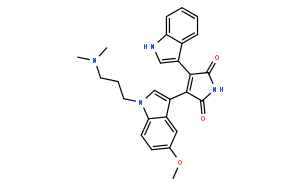| In vitro |
Go 6983 (300 μM) suppresses PKCμ auto-phosphorylation by 20% reduction in NIH3T3 transfected with PKCμ. [1] In hearts reperfused with PMNs and Gö 6983 (100 nM), left ventricular developed pressure (LVDP) and the rate of LVDP recoveres to 89% and 74% of baseline values, respectively, significantly higher than PMNs alone. Gö 6983 (100 nM) significantly reduces PMNs adherence to the endothelium and infiltration into the myocardium compared with Ischemia followed by reperfusion (I/R)+ PMN hearts, and significantly inhibits superoxide release from PMNs by 90%. Gö 6983 attenuates post-I/R cardiac contractile dysfunction in the presence of PMNs, which may be related in part to decreased superoxide production. [2] Gö 6983 significantly inhibits antigen-induced superoxide release from leukocytes of patients previously sensitized to tree pollen. Go 6983 inhibited intracellular Ca(2+) accumulation in human vascular tissue, suggesting a mechanism for its vasodilator properties. [3] Go-6983 (1 μM) combined with Ro-31-8425 (390 nM) slightly inhibits Angiotensin II–induced PLD2 activity in PGSMCs. [4] Go 6983 is isoform-specific PKC inhibitor that target the ATP binding site. Go 6983 inhibits ΔPfPKB activity with an IC50 of 1 μM. In Go 6983 (5 μM)-treated cells, the number of rings in the following cycle is markedly less compared with the control cultures. Go 6983 (5 μM) treatment results in an almost 60% decrease in formation of new rings in P. falciparum cultures. [5]
|

 COA
COA MSDS
MSDS HPLC
HPLC NMR
NMR